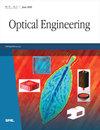Tunable optical buffer based on VO2/Si hybrid waveguide by optically induced phase transition
IF 1.1
4区 工程技术
Q4 OPTICS
引用次数: 0
Abstract
Abstract. A tunable optical buffer composed of a side-coupled racetrack microring resonator (RMRR) sequence and phase change material vanadium dioxide (VO2) films has been designed and simulated with pass-through and drop functions. By optically induced phase transition of VO2, the number of coupled RMRRs is dynamically controlled to realize the required delay time and the ultra-fast response. Simulation results show that the buffer with 12 RMRRs achieves a tunable delay of up to 309.6 ps, a working bandwidth of 306 GHz, and a super-fast response of 0.62 ps. The delay loss and power consumption are 0.012 dB / ps and 0.194 mW / ps, respectively. These findings suggest a new approach to realizing tunable delay in all-optical networks.通过光诱导相变实现基于 VO2/Si 混合波导的可调谐光缓冲器
摘要。设计了一种由侧耦合赛道微波谐振器(RMRR)序列和相变材料二氧化钒(VO2)薄膜组成的可调谐光缓冲器,并模拟了其传递和下降功能。通过 VO2 的光学诱导相变,可动态控制耦合 RMRR 的数量,以实现所需的延迟时间和超快响应。仿真结果表明,具有 12 个 RMRR 的缓冲器可实现高达 309.6 ps 的可调延迟、306 GHz 的工作带宽和 0.62 ps 的超快响应。延迟损耗和功耗分别为 0.012 dB / ps 和 0.194 mW / ps。这些发现为在全光网络中实现可调延迟提供了一种新方法。
本文章由计算机程序翻译,如有差异,请以英文原文为准。
求助全文
约1分钟内获得全文
求助全文
来源期刊

Optical Engineering
工程技术-光学
CiteScore
2.70
自引率
7.70%
发文量
393
审稿时长
2.6 months
期刊介绍:
Optical Engineering publishes peer-reviewed papers reporting on research and development in optical science and engineering and the practical applications of known optical science, engineering, and technology.
 求助内容:
求助内容: 应助结果提醒方式:
应助结果提醒方式:


